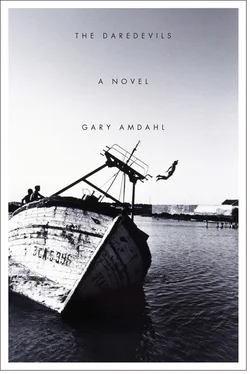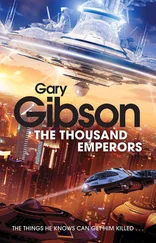Minkowski’s eyes widened startlingly, and Charles prepared himself to laugh at the joke he thought was surely coming, but Minkowski merely whispered, “Here comes the sonofabitch now.”
It was the man Charles had noticed earlier, the man of marble. He was now entering the bus, which dipped, as if with great statuary weight, toward the curb. The man, Swanson, smiled hugely, with his mouth open and red, and raised the narrow slits through which he gazed back out the door at them so wide it became comical and then unsettling. They entered the bus. Swanson appeared to relax: it was as if a statue were coming to life. He held out a nickel to Minkowski, who took it with a show of distaste.
“Remind me,” said Swanson with a rough, deep voice, “to buy you a decent cigar one of these days.” He sniffed the stale air of the bus’s interior and shot a reproving glance at its driver.
“Don’t smoke,” said Minkowski.
“Hell you don’t. Seen you do it.” He touched the wide brim of his marble hat and said to Vera: “Seen you too. Daring for a dame.”
“No, sir,” said Vera, “I do not believe that you have.” She beamed.
“What’s your name again.?” asked Swanson amiably.
“Pardon me,” said Vera, still smiling prettily. “I do not hand my name out to just any old clown who happens along with a wish to know it.”
“ Warum nicht ? Got something to hide?” Swanson’s round face got rounder and redder. “I’m only kidding you, miss!”
“What is your name, sir?” asked Vera. It was unlikely but possible that Swanson did not in truth know who she was, merely of her and not by sight, as Vera had been peripheral to his and his employer’s concerns for several years, and figuring hardly at all on the West Coast. So she pretended not to know his name or face, either.
“Swanson,” said Swanson, “Rudolph Swanson,” leaning toward Vera over the back of a seat and holding out his hand, but looking Charles up and down. “I’m with the public utilities. What do you do, miss? If you don’t mind my asking like you did your name, which I respect but do not understand. Still in school? This must be your boyfriend! Say, don’t look like that! I’m a friend of your owner/operator here, and I guess you are too, by the way you’ve been chatting here so earnestly. So that makes us friends or at least I hope so. That’s how I like to approach folks. Don’t mean to pry, I most sincerely do not.”
Within the narrow confines of the space left in the air by the detective’s bullying garrulousness, Charles thought he ought to say something, felt something like a manly duty to speak up firmly but diplomatically, but was confused and could think of nothing to say. He felt naked and afraid of what would happen next — not an actor at all. If the man was a big-time Pinkerton or ex-Pinkerton, why did he not know who Vera was? And himself too: How could he not know he was talking to William Minot’s son? Was he pretending not to know? If he was in deep with the URR people, he was capable of any grotesquerie Charles could imagine. He decided, in that moment of equal and opposing forces — youthful bravado working on youthful fear with traces of erotic mania still filtering out of his blood — to act as if he knew the answers to these and other questions. It was a kind of dramatic irony, not as he and Sir Edwin theorized and practiced it, where the real and the faked real were both unreliable, but as he’d understood the idea from lecturers at college: he would know something his audience, the marble detective, did not, thus giving himself the upper hand and perhaps causing the man to see the episode as a show, and be amused, entertained by it, rather than as a part of life and therefore requiring action, a judgment and an action, such as: they are a threat to the public welfare and I must crush them. Yes, that was it. The idea blazed past his eyes, streaked through his mind like comets crashing into planets that awoke and trembled with lust — who would be the actor on this stage? Who would get to act, and in the service of what would that action occur? He raised his head imperiously, and stared with rich-boy hauteur into Swanson’s pale eyes. Swanson closed his mouth and blinked. Charles felt unimaginably powerful. He relaxed.
“Wait, sure,” said Vera. “I know you.” She freshened her smile, making it friendly again. In that instant he felt he could never act again unless she was acting with him. “Don’t I? Weren’t you in the papers a while back?”
Swanson snorted. “Nope. Not that type.”
Charles remembered several articles in the Bulletin that Father had put under his nose over a hundred breakfasts, having to do with abuses committed by private detectives. He continued to stare with a thrillingly detached, level cool — encouraged wildly by his perception of Vera’s similar condition — at Swanson.
“What type are you?” asked Vera.
“Say, you some kind of detective, little girl?” Swanson winked at Minkowski, who was black in the face with rage.
“Who,” asked Vera, “did you say you worked for?”
“I insist you tell me who you are before I start repeating myself!” chuckled Swanson.
“Aren’t you that famous detective? The one that beat up that fellow in the hotel room in where was it?”
“Oh my goodness!” shouted Swanson. “Certainly not!”
“It must have been that business in Stockton, then, the uh. oh, let me see, let me see now, the ummm—”
“Merchants and Manufacturers’ Association,” Charles said, drawing on resources he’d not had to measure or verify before speaking as casually as if the subject were baseball and the consequences for error nothing more serious than a corrective wisecrack — or lines in a play. “You played for them couple years ago,” he went on, as everybody ceased what they’d been doing in the scene to stare at him in astonishment. “The, uh, the sheriff there arrested a fellow who’d been, what, attempting to plant dynamite, wasn’t it? In the Sperry Flour Mill? If I’m remembering this right, and I sure could be wrong, don’t quote me — and in the lobby of the Stockton Hotel.?”
“Yes!” said Vera, “that’s right, and the Stockton Iron Mill and a couple other places but the sheriff—” she paused to feign a giggle behind her hand, “— the sheriff figures he’s got some kind of anarchist for sure, couldn’t be happier, couldn’t be more proud, you know, and then he finds out to his horror that the man is in fact a detective’s assistant in the employ of the Merchants and Manufacturers’ Association! That wasn’t you? I mean the detective, of course, not the knucklehead assistant.” Vera smiled coyly.
“I’ll tell you what,” grinned Swanson, “you’re one well-informed goddamn little schoolgirl.”
“I’ll tell you what, Mr. Swanson, I’m not a goddamn little schoolgirl. I’m a citizen of the United States of America and I like to read the newspapers, I like to read them all, you know, and the fine print too, just to make sure everybody’s getting a fair shake .”
“Fair shake! Hear that?” Swanson addressed his question to Minkowski. “Fair shake? I don’t — a fair shake, you say. I don’t think so. Not in this world. I mean, really, come now. If you aren’t a little schoolgirl, you’re sure acting like one!” He laughed good-naturedly. “The last thing this world is is fair. You just have to get over that! Find out how things go in a general sort of way, and then do like most everybody else does. But a fair shake now, isn’t that a newspaper itself? Kind our friend the driver here likes to peruse? Get all squinty-eyed and black-furrowed over? I read those rags too. Don’t I?” he asked Minkowski, who turned away, started his motor and revved it angrily — probably doing it some damage, Charles thought: settle down, don’t let him get to you.
Читать дальше












